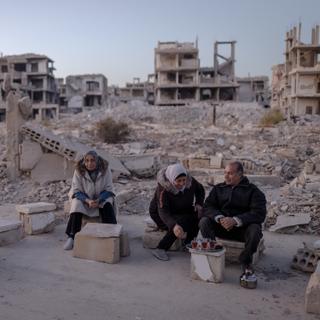


In the Yarmouk refugee camp, the broken future of Syria's Palestinians
NewsThis area on the southern outskirts of Damascus is the beating heart of the Palestinian diaspora. After being reduced to rubble during the civil war, only a few thousand inhabitants still live there.
Ghostly ruined buildings encircle the small martyrs' cemetery in the Palestinian refugee camp of Yarmouk, on the southern outskirts of Damascus. The tombstones have all been ransacked. Fatima Chihabi moved slowly through the debris, holding her daughter-in-law's hand in hers. The 65-year-old Palestinian knows only that her son is buried next to her nephew. "He has no headstone. We quickly buried him on November 20, 2012, and never came back," said Chihabi, her head covered in a white veil, her large blue eyes covering her emaciated face marked by deprivation.
Her son was 30, with a wife and two children, when he disappeared as he was leaving the camp. "I received a phone call telling me that he had been taken to Hospital 601 [a Syrian army air force torture site]. A neighbor recognized him at the hospital and told me to come and get him. His organs had been stolen. We prayed to God to avenge us, and thanks be to God, it happened," Chihabi consoled herself, blessing the fall of former dictator Bashar al-Assad on December 8.
'A second Nakba'
Since Yarmouk was reconquered in 2018 by the men of the 4th division, an elite unit commanded by Maher Al-Assad, the brother of the deposed president, Syrian soldiers posted at the roadblock next to the cemetery had forbidden anyone to approach it. "They broke the tombs. Some are those of the 'martyrs' who died in the fighting in Beirut in 1982 during the Israeli invasion. The cemetery's janitor was kidnapped by the regime in 2018, and we've had no news of him since," recalled Nafez Abou Yaara, who was forced to move to the suburb of Naher Aisha.
You have 77.33% of this article left to read. The rest is for subscribers only.
